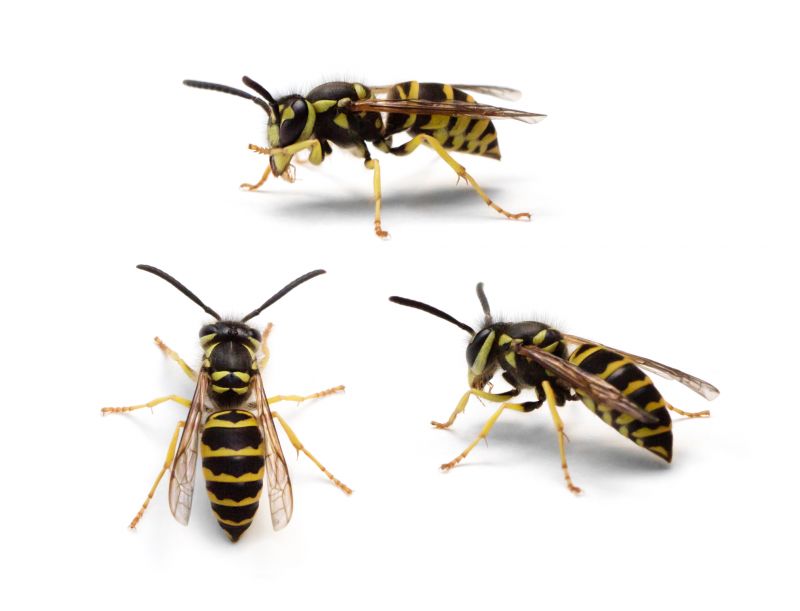Leading Products For Effective Yellow Jackets Control Strategies
Choose from the top-rated extermination products designed to target yellow jackets and prevent future nests.
 Yellow jackets can become a nuisance during warmer months, often building nests in outdoor spaces such as eaves, shrubs, or underground. Effective management of these insects involves selecting appropriate products that target their nests and reduce their presence around homes and gardens. A variety of options are available, ranging from traps and sprays to bait stations, each designed to address different levels of infestation and specific locations.
Yellow jackets can become a nuisance during warmer months, often building nests in outdoor spaces such as eaves, shrubs, or underground. Effective management of these insects involves selecting appropriate products that target their nests and reduce their presence around homes and gardens. A variety of options are available, ranging from traps and sprays to bait stations, each designed to address different levels of infestation and specific locations.
Top Overall Option
Universal Yellow Jacket Trap
A versatile trap designed to attract and capture yellow jackets effectively, suitable for placement around yards, decks, and outdoor structures. It features a bait chamber and a secure catch container, making it easy to monitor and maintain. This trap is adaptable to various environments and can help reduce the presence of yellow jackets without the need for sprays or chemicals.
Types of Products For Yellow Jackets Exterminations
Aerosol Spray for Nests
Directly targets active nests with fast-acting aerosol formulations designed to incapacitate yellow jackets on contact.
Liquid Baits
Attractive liquid baits that lure yellow jackets and are combined with insecticide to reduce their numbers over time.
Trap Stations
Stationary traps that use bait to lure insects and trap them, ideal for long-term monitoring.
Underground Nests Removal Kits
Specialized kits for safely treating and removing underground yellow jacket nests.
Wasp and Hornet Sprays
Multi-purpose sprays effective against various stinging insects including yellow jackets.
Nest Removal Tools
Tools such as long-handled removers designed to safely extract and remove nests manually.
Sticky Traps
Adhesive traps that capture yellow jackets as they enter or exit nests or foraging areas.
Electric Zappers
Devices that attract yellow jackets with light and electrocute them upon contact.
Protective Clothing
Full-body suits and gloves designed to protect users during nest removal or treatment.
Natural Repellents
Non-chemical deterrents that may help keep yellow jackets away from specific areas.
DIY Trap Kits
Complete kits for creating homemade traps using common household items and attractants.
Popular Choices
Widely used bait stations that attract yellow jackets and trap them efficiently, suitable for yard use.
Commonly chosen for their quick action on active nests, allowing for targeted treatment.
Popular for their reusability and ease of maintenance, these traps can be used season after season.
Effective options for managing nests hidden beneath the ground surface, frequently used in lawn areas.
Commonly used for outdoor patios and decks, attracting and zapping yellow jackets with light and electricity.
Popular among homeowners comfortable with DIY projects, these kits include tools and instructions.
Frequently selected for their ease of use and immediate impact on visible nests.
Effective as a preventative measure around entry points and outdoor dining areas.
Preferred for reaching nests in hard-to-access locations from a safe distance.
Popular among those who prefer to handle nests manually, offering full-body protection.
Choosing the right product depends on the severity of the yellow jacket activity and the area of concern. For instance, some products are designed for direct application to nests, while others function as attractants that lure the insects away from human activity zones. Proper application and safety precautions are essential to ensure effective results and protect household members and pets.
In addition to chemical solutions, there are mechanical and manual options such as nest removal tools and protective clothing that can assist in safely managing or removing nests. Combining multiple approaches can often yield better results, especially in cases of large or hard-to-reach nests. It is important to read product instructions carefully and to consider the timing of application for optimal effectiveness.
Overall, understanding the behavior of yellow jackets and selecting suitable products tailored to specific situations can help mitigate their presence and reduce the risk of stings. Regular monitoring and maintenance can also prevent new nests from forming, contributing to a safer outdoor environment during active seasons.
Key Buying Considerations
- Identify whether the yellow jackets are nesting above ground or underground to select the appropriate product.
- Consider the size and location of the nest to determine if direct treatment or trapping is more suitable.
- Evaluate safety features such as protective gear or distance-range sprays to prevent stings during application.
- Look for products with clear instructions and safety warnings to ensure proper handling and use.
- Assess whether the product is reusable or single-use, depending on your long-term management plans.
- Choose traps or bait stations that are weather-resistant for outdoor use in various conditions.
- Determine if the product is designed for active nests or for preventative measures in areas prone to yellow jacket activity.
- Review the level of insecticide or attractant used to match your comfort level and infestation severity.
- Consider ease of installation and maintenance, especially for traps and bait stations intended for long-term use.
- Check for compatibility with other pest control methods you may already be using.
- Read customer reviews and ratings to gauge real-world effectiveness and ease of use.
- Ensure the product is suitable for use around children and pets if applicable.
- Look for products that offer coverage for the targeted area size, whether small yard sections or larger outdoor spaces.
- Evaluate whether the product can be safely used indoors or only outdoors, depending on your needs.
- Consider environmental factors such as wind or rain that might affect the product’s performance.
